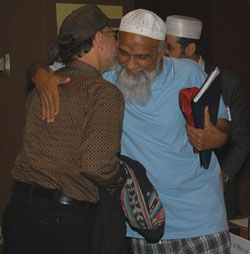Religion is often cited as a cause of violent conflict, yet there is little recognition of how faith communities contribute toward peacemaking in zones of conflict throughout the world.
Religion is often cited as a cause of violent conflict, yet there is little recognition of how faith communities contribute toward peacemaking in zones of conflict throughout the world.
This two-day workshop centered on enhancing the peacemaking capacities of individuals and faith-based organizations by focusing on objectives, methods, and best practices of interfaith dialogue, a form of facilitation increasingly recognized for its relevance to 21st Century conflict.
Leaders from Jewish, Christian, and Muslim faith communities from the greater Washington D.C. area took part in the workshop. The Institute's Religion and Peacemaking and Training programs organized the event, cosponsored by the Interfaith Conference of Metropolitan Washington (IFC).
The workshop featured presentations on Religion and Peacemaking, Principles of Conflict Resolution, Resources for Interfaith Dialogue from the Abrahamic Traditions, Youth and Interfaith Dialogue, and the Role of Religion in the Guatemala Conflict.
Each presentation served as a starting point for vigorous discussion, small-group exercises, and role-play simulations facilitated by Institute trainers and staff members, including Keith Bowen and Jacqueline Wilson from the Training program and Paul Wee and Qamar-ul Huda from the Religion and Peacemaking program. Additional presenters included Clark Lobenstine from the Interfaith Conference of Metropolitan Washington and Eboo Patel from the Interfaith Youth Core.
The first iteration of this workshop, held at the Institute July 26-27, 2006, will serve as a model for future training in zones of conflict.



